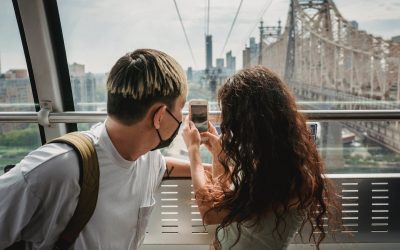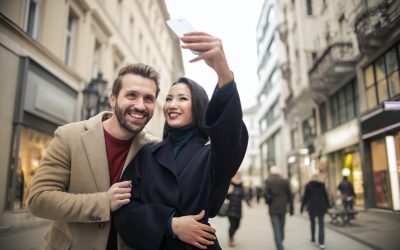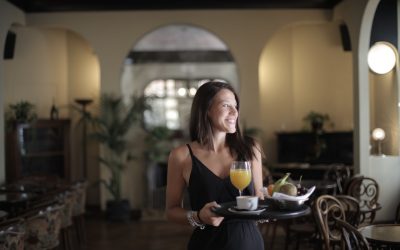Why Word-of-Mouth is Still a Powerful Marketing Tool for Tourism


Forget the big billboards and radio jingles–it’s time to rely on your tourists’ words.
In a world full of digital ads–that we so eagerly skip–we sometimes forget that word-of-mouth marketing is still a crucial tool to promote our destination. But, when we think about word-of-mouth, we first picture someone talking directly to another person; talking about their experiences and recommendations on a close, personal basis. We rarely picture it as an online and amplified way, but that’s exactly how word-of-mouth marketing works in our digital world. We just don’t give it that exact name anymore.
But how does word-of-mouth happen nowadays?
In the era of online social interaction, everyone can be connected–no matter how distant they physically are. This fact was proven during the 2020 worldwide pandemic, when meetings, family reunions, birthdays, weddings and even funerals featured online attendance. Now, word-of-mouth can happen between people a thousand miles away from each other and still maintain the same level of trustworthiness.
Online reviews. Influencer campaigns. User-generated contents. Compliments and complaints posted on a social media feed. We give it another name, but deep down, these are nothing but word-of-mouth marketing techniques. And, as a tourism operator or a destination marketer, you need to take advantage of it. Now more than ever.
With so many advanced marketing tools out there, why word-of-mouth still works?
According to research conducted by Nielsen, 92 percent of consumers say they trust recommendations from friends and family above all other forms of advertising. Consumer reviews on online platforms, such as TripAdvisor, Yelp and Foursquare ranked as the second most trusted source, with 70 percent indicating they trust the online reviews. Social media ads, website banners, and search engine advertising ranked in the lowest levels of confidence from consumers–not surprisingly.
When it comes to tourism, consumers search for recommendations for almost every activity or plan they have. What restaurant serves the best food for an affordable price? What hotel has the best reviews? What activity is the most popular and safe for children? And this search for online opinions from fellow travellers occurs in the early stages of planning a trip–and most of the time it can influence the destination chosen for the travel.
That’s why we gathered in this article important factors to consider about this new model of word-of-mouth marketing, including why invest in it and how you can apply it to your destination marketing plan.
It makes your marketing more personal, no matter the distance.
For most consumers, word-of-mouth is a more reliable marketing process than unsolicited advertising. This happens because they are shown real experiences of people who have been in a destination rather than just reading a promotional message in an advertisement or simply looking at a wonderful brochure with great pictures.
It gets more personal when the traveller can identify themselves with other visitors who have been in a place they are planning to visit, and the message is coming from fellow consumers instead of a company or agency, whose main goal is to sell them a package or a trip. And with technology, the personal touch, shifted away from the blunt commercial message, is easily reached, no matter the distance. Using influencers to deliver a conversational message, including their self-made pictures and videos of the activity or destination, is way more convincing to the potential traveller than posed photographs with models at a beautiful scenery.
An exceptional experience can lead to an exceptional recommendation.


A 2019 survey found that 82% of consumers read online reviews for local businesses, with 52% of 18-54-year-olds saying they ‘always’ read reviews. But relying on traveller’s reviews online also means relying on the quality of your destination’s experiences.
Did you know? A visitor who has a negative experience is highly likely to share that experience by leaving a bad review, sometimes as a warning to fellow tourists considering that destination, operator or activity. A visitor who has a positive experience, on the other hand, is unlikely to leave a good review. Researches show only one in 10 happy customers writes a good review.
An unfavourable review can have a bigger impact than a positive one. Marketing data indicates that negative reviews dramatically influence our buying behaviours, and since there are significantly less negative reviews than positive ones online, the negative ones catch our attention more.
We also look at negative reviews and project that into our future experiences: we instantly fear that might happen to us too.
It helps build a community and a more powerful brand.
Encourage customers to share their travel experiences as your guest on social media and refer your business to their friends and family. For each new traveller they bring in, give them a reward, such as a free night’s stay or 10% off their next booking.
Offering referral programs with incentives is an ideal way to get customers talking about your brand, therefore growing your credibility and reputation.
Offer ‘surprisingly great’ customer service to all customers will also to get them talking about it. Keep in mind research says happy customers will tell at least 10 friends and family good things about your business, dissatisfied customers will tell many times that if they had a poor experience.
How can you invest in this new kind of word-of-mouth marketing?
There are several effective and simple ways to take advantage of this kind of promotion.
1. Show visitors’ testimonials on your website


Testimonials from previous guests and visitors are a great way to build credibility and promote your business or destination taking advantage of past experiences provided. The best testimonials are real, genuine, helpful, and include the name of the customer.
That’s why it’s so important to maintain contact with your guests and consumers even after the travel or experience has ended. Collecting their information and asking for reviews and testimonials is not time-costly and it can improve both your relationship with the visitor and your future marketing.
2. Don’t forget to encourage reviews


If you want to use this kind of marketing, good reviews are essential. Reviews have a great impact on tourism businesses by generating exposure to the destination and operators, increasing credibility, and giving customers an idea of what they’ll get when they book with you.
Encourage and collect reviews from travellers who’ve booked with you to increase your social proof–defined as “the tendency to see an action as more appropriate when others are doing it.” Ask customers to leave feedback on your website, on TripAdvisor, on your Facebook page, and relevant industry sites.
3. Offer an incentive or referral program
As we talked previously, offering referral programs with incentives is an ideal way to get customers talking about your business or destination. You can encourage customers to share their travel experiences as your guest on social media and refer your business to their friends and family. For each new guest or customer they bring in, you can offer a reward, such as 10% off their next booking.
4. Provide great–not just good–experiences


Providing quality service should always be your goal, but an over-the-top experience will get your guests talking about it. Satisfied customers–whose expectations were met–don’t necessarily leave reviews, but dissatisfied customers will tell many times that if they had a poor experience. Attention to detail, a friendly but comfortable service, and personalized experience can lead a guest or visitor to reverberate the great experience they had!
Learn 4 tips to provide a great tourist experience here!
5. Train your locals and front-line workers
If getting real recommendations from fellow visitors can make a huge impact on deciding where to go, what to do and enjoying a trip to the fullest, imagine the impact of getting good advice from people who live all year in the region! Training your locals on how to deliver a good customer service and empowering them with knowledge about all that your region has to offer for every kind of tourist is essential.
Our program was designed especially to help you with that–we created a workshop-in-a-box that provides everything you need to train your locals and front-line workers on everything your region has to offer!
Get to know more about the Experience Specialist Program and request your free marketing information package!
More Resources & Tips
The 6 biggest travel trends for 2021
If 2020 was the year that travellers had to put their wanderlust on hold, 2021 is the year of new,...
6 Different Kinds of Tourists and How to Identify Them
No tourist is the same. Do you know how to identify them?They might look similar, with their...
4 Tips to Help you Provide a Great Tourism Experience
Everyone can have a tourism experience, but how to make sure it's a great one? A good tourism...




